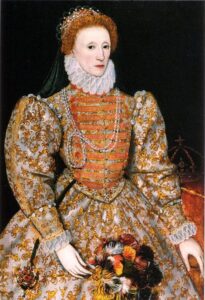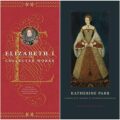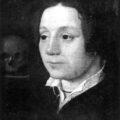
Elizabeth definitely had a way with words and also the knack of making people sit up and listen. If you take the time to read her speeches and even read them out loud, you will see how rousing and passionate they were. Here is her most famous speech, the Tilbury speech, spoken by Glenda Jackson as Elizabeth I:-
Elizabeth I made this speech to the troops gathered at Tilbury in Essex on the 9th August 1588 (old style date). The troops were readying themselves to defend England from Spanish invasion and Elizabeth realised the importance of rallying the troops with her presence and rousing words. Elizabeth appeared before the troops on horseback, dressed in white with a silver cuirass (breastplate) and escorted by Lord Ormonde, carrying the Sword of State and flanked by the Earl of Leicester and his stepson the Earl of Essex.
It is not known whether this was the exact speech that Elizabeth I made to the troops, as it comes from a letter written in 1623/1624 by Dr Leonel Sharp to the Duke of Buckingham around 35 years later, but the words “I know I have the body but of a weak and feeble woman; but I have the heart and stomach of a king, and of a king of England too” are very much in keeping with the way that Elizabeth would refer to her father, Henry VIII, and how she would draw on his popular image and her realtion to him. Here is a transcript of the Tilbury Speech:-
My loving people,
We have been persuaded by some that are careful of our safety, to take heed how we commit our selves to armed multitudes, for fear of treachery; but I assure you I do not desire to live to distrust my faithful and loving people. Let tyrants fear. I have always so behaved myself that, under God, I have placed my chiefest strength and safeguard in the loyal hearts and good-will of my subjects; and therefore I am come amongst you, as you see, at this time, not for my recreation and disport, but being resolved, in the midst and heat of the battle, to live and die amongst you all; to lay down for my God, and for my kingdom, and my people, my honour and my blood, even in the dust.
I know I have the body but of a weak and feeble woman; but I have the heart and stomach of a king, and of a king of England too, and think foul scorn that Parma or Spain, or any prince of Europe, should dare to invade the borders of my realm; to which rather than any dishonour shall grow by me, I myself will take up arms, I myself will be your general, judge, and rewarder of every one of your virtues in the field.
I know already, for your forwardness you have deserved rewards and crowns; and We do assure you in the word of a prince, they shall be duly paid you. In the mean time, my lieutenant general shall be in my stead, than whom never prince commanded a more noble or worthy subject; not doubting but by your obedience to my general, by your concord in the camp, and your valour in the field, we shall shortly have a famous victory over those enemies of my God, of my kingdom, and of my people.
Another version of this speech is recorded by William Leigh in 1612:-
Come on now, my companions at arms, and fellow soldiers, in the field, now for the Lord, for your Queen, and for the Kingdom. For what are these proud Philistines, that they should revile the host of the living God? I have been your Prince in peace, so will I be in war; neither will I bid you go and fight, but come and let us fight the battle of the Lord. The enemy perhaps may challenge my sex for that I am a woman, so may I likewise charge their mould for that they are but men, whose breath is in their nostrils, and if God do not charge England with the sins of England, little do I fear their force… Si deus nobiscum quis contra nos? (if God is with us, who can be against us?)
You can read more of Queen Elizabeth I’s speeches, including the Golden Speech, by going to our Speech page.
What is your favourite Elizabeth I speech or quote? Please share in the comments section below.
Katherine Parr
Those of you who have enjoyed my recent examination of Katherine Parr’s relationship with Thomas Seymour will be interested to know that historian and Katherine Parr biographer, Linda Porter, has written a guest post over at The Anne Boleyn Files – see “Last But Not Least: The Enduring Fascination of Katherine Parr”. Katherine Parr and Elizabeth I are among the women I have looked at in my celebration of Tudor women for International Women’s Day – see “Celebrating the Six Wives and Tudor Women”.










